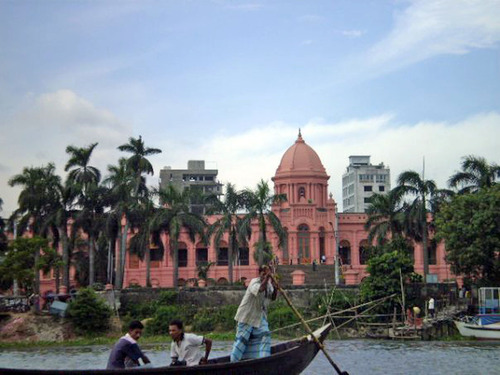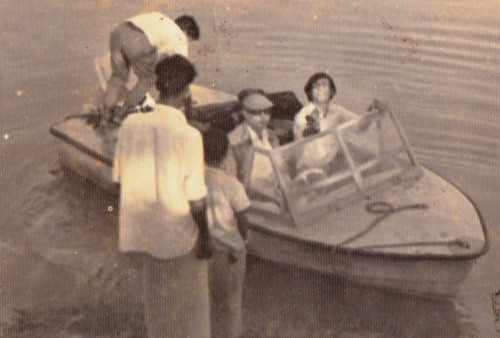By Abbas Nasir
Published with permission from the writer
THE 1971 war may have been 30 years in the past. But this was my first visit to Dhaka. The day had to start at the National Martyrs` Memorial at Savar, some 35 kilometres from the capital.
On entering the memorial grounds, you skirt around various features, and then walk along the length of a pool of water at the head of which the multi-leaf triangular memorial rises 150 feet into the air.
Either side of it are mass graves, the final resting place of some of the (estimated) 30,000 people whose bodies were found in that area alone after Pakistani troops surrendered to the Indian army on Dec 16.
One was carrying an enormous burden on the shoulders. I may not have been an adult in 1971 but knew well what horrors we, the West Pakistanis, had visited on our eastern wing compatriots.
Solely for their crime of seeking their legitimate political rights; asking for transfer of power after their chosen party had decisively emerged as the majority party in the free and fair elections held the year earlier.
The election result shocked the ruling generals whose intelligence reports had painted a pretty fragmented post-election scenario. When the election didn`t yield their desired results, they delayed the transfer of power, and mass protests erupted in East Pakistan.
These protests were met by the only tool the army leadership possessed: more and more brutal force. This resulted in a flood of refugees to India which helped arm and organise the resistance and would later declare war.
When the resistance started to get robust, the conflict spiralled into a tale of unimaginable repression where the Pakistani army, paramilitary units and their collaborators` militias mainly comprising Jamaat-i-Islami zealots unleashed mass murder, mass rape.
While the Pakistani media blacked it out totally, the western media gave front-page coverage to this massacre. It would be many years before stories would emerge of the bestiality (in a different proportion of course) of the Mukti Bahini, the liberation army, on non-Bengalis (non-combatants) too.
As I stood head bowed in silent tribute, in contrition, a lump appeared in my throat. How could we? How could we inflict such pain on our own people? I must have asked myself a hundred times in utter shame.
Don`t know how long it was before a gentle tug on my sleeve made me turn to my visibly moved, red-eyed colleague Mahmud Ali who was reminding me we were running late for the next, equally important engagement.
Yes, I was going to see the Kalimullahs, the first time after 1967. But as we approached their Gulshan home I was filled with trepidation. What if they were still bitter about `71? What if they`d politely said yes but didn`t really wish to see me, a (West) Pakistani.
Within moments of arriving at their beautiful home, however, all my fears evaporated. I needn`t have worried. For neither had the stunning Auntie Tanima`s warmth waned nor had her affection for me or my parents (whom I lost in the late 1970s) gone anywhere.
A stroke had confined Uncle Kalimullah to bed and pretty much consumed the handsome cavalry lieutenant-colonel, our neighbour and commanding officer of the 24th Cavalry, I remembered from Kharian.
Asif and Maleeha, like me, were parents now. We reminded each other of every mischief, of each naughty trick we played as children but all this followed a serious conversation where I started by saying how guilt-ridden and contrite thinking Pakistanis were at the events of `71.
All Auntie Tanima`s love and humanity wanted was to put me at ease. There was no bitterness, no anger. She insisted that Asif tell me a story dating back to the end of the 1971 war. Asif, who told me he`d joined the Mukti Bahini aged 14 in 1971, narrated thus in a photographic recollection.
“A few days after the surrender, my father was talking to some visitors in the garden, when the doorbell rang. One of our staff members went to the gate and then returned to whisper something in my father`s ear.”
“Daddy turned to me and said `Asif go and see who it is`. I went and opened the gate. There was a Sikh major of the Indian Army standing outside. He said hello and asked if this was Col Kalimullah`s home.”
“I said it was. He then gesticulated to his driver who asked someone to come out of the back of the covered jeep. It was a slim, tall, young yet dishevelled man in a khaki military uniform whose epaulettes had been torn off.”
“The Sikh major`s prisoner introduced himself as a captain in the Pakistan Army, the son of a friend and colleague of my father`s. `When my unit was transferred here, my parents asked me to make sure your family was OK. But I landed here in the middle of the war and couldn`t`.
“I asked him to come in while the major said he`d wait outside. He met my parents and told them he was thankful to the major for bringing him to our place so he could see for himself we were alright. Otherwise, `whenever I get home my parents won`t forgive me if I say I couldn`t check`.
“The captain quietly said his goodbyes and left. We were never to see him again as we understand he was soon moved to a PoW (prisoner of war) camp in India. We live with the images of our slaughtered people. But that individual`s act of kindness too we`ll never forget.”
Don`t you wish we`d also never forgotten how and why we got to Dec 16? Time flies. It has been more than a decade since I stood at the Savar memorial. It`s been 40 years since `71. But tell me what`s changed?
The writer is a former editor of Dawn .
abbas.nasir@hotmail.com



















